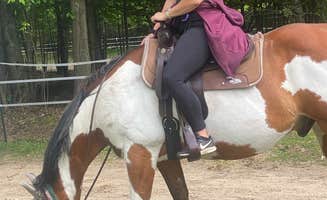The Manistee National Forest offers several equestrian camping options near Rockford, Michigan. Located across nearly one million acres of western Michigan, this forest contains a network of designated horse trails connecting various campgrounds that accommodate riders. Camping elevations range from 700 to 1,100 feet with summer temperatures typically between 70-85°F during peak riding season.
What to do
Trail riding opportunities: The White River Campsite area provides access to miles of forest trails where riders can explore at their own pace. "There are dispersed options as well as docked site. It's in a forest, so bring a compass if you plan to do some hiking," notes one White River Campsite visitor.
Scheduled horseback rides: Beginners and families can participate in guided rides at Double RR Ranch RV Resort, which offers a gentle experience even for first-timers. "We enjoyed a reasonable trailride on horses thru a shallow part of the river. Very easy for inexperienced riders and kids," reports one camper who appreciated the beginner-friendly approach.
River exploration: Many equestrian sites are located near water features that add variety to your camping experience. "There is a river to explore and we always get a riverfront site. Rivers are just fun for fishing, throwing stones, canoeing," mentions a visitor to Double RR Ranch, noting the water activities complement the horseback riding options.
What campers like
Spacious parking areas: Timbers Edge Campground provides sufficient room for horse trailers, which many equestrian campers value. One visitor notes, "We stayed here during their Equestrian Weekends several years in a row, great hosts and large lots make this place a nice hidden gem!"
Natural surroundings: The undeveloped nature of many sites appeals to horse campers seeking a genuine outdoor experience. A Hungerford Lake Campground visitor commented, "Dispersed camping and camp sites available. There are horse staging areas and hiking trails. The lake is nice, small enough for a kayak/ no motor boat, nice."
Seasonal variations: The equestrian camping season typically runs from May through October, with different experiences throughout. "I went in November. Most campers were there on the weekend... A lot of horses and hunters. Price was good for electric and water. Nice for dog walking. Friendly managers," reports a Timbers Edge camper who visited during the shoulder season.
What you should know
Varying facilities: Equestrian campgrounds range from primitive to those with basic amenities. At Ely Lake Campground, "There are no bathrooms, just pit toilets. There is no electricity. There is a hand pump for water, although I would recommend bringing your own drinking water because the water from the hand pump is very discolored."
Bring your own equipment: Most horse camping locations require you to bring everything your horse needs. "Normal function for horseman is to ride from trailer," notes a Timbers Edge visitor, highlighting the expectation that riders are self-sufficient with their own gear.
Terrain considerations: Some trails may present challenging conditions depending on weather. "The road seems a bit sketchy but should be okay for most vehicles," mentions a White River Campsite visitor, suggesting that access to some equestrian areas may require careful driving.
Tips for camping with families
Kid-friendly activities: Several equestrian campgrounds offer additional recreation beyond horseback riding. At Duke Creek Campground, "Your kids will LOVE this place-we had a blast! Train rides, Pool, Scavenger hunt, trails, bike rides, there just weren't enough hours in the day!"
Schedule flexibility: Plan for variable weather conditions that might affect riding schedules. "We should have reserved an entire week! The facilities were spotless, there is a store, gated entrance, nice shady lots, friendly staff," mentions a Duke Creek visitor who found more to do than initially expected.
Consider noise levels: Some campgrounds may have different atmospheres depending on when you visit. "This is a wonderful experience until about 10:30 PM on Friday and Saturday night. This place attracts a rowdy crowd and in the evenings," reports an Ely Lake camper, suggesting weekday visits might be preferable for families.
Tips from RVers
Site selection matters: At many equestrian campgrounds, site layout varies considerably. "The sites were very small at this campground. Our fire pit was so close to our trailer we didn't dare use it," notes one Duke Creek visitor, emphasizing the importance of checking site dimensions before booking.
Trailer access routes: Some forest roads leading to equestrian camping areas may be challenging for larger rigs. "This is more suitable for tents or maybe small campers. Best access seems to be along 160th avenue south of Arthur road," advises a White River Campsite visitor regarding access for horse trailers.
Seasonal considerations: Many equestrian campgrounds have limited services during shoulder seasons. "No cell service," notes a Timbers Edge visitor, highlighting the importance of preparing for disconnected camping, especially during off-peak times when fewer campers are present.


